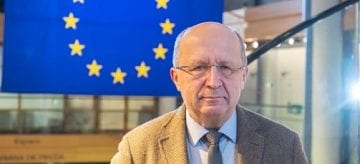Belarus: Yesterday and tomorrow

Andrius Kubilius,
Member of the European Parliament, former Prime Minister of Lithuania
Stolen and lost elections
On 9 August, the People of Belarus have cast their vote in hope for change. However, the elections were stolen from the People of Belarus: main opponents were either imprisoned, barred from registration or driven out of the country. The opposition was “robbed” of members of local electoral commissions, observers, even the rallies. Lukashenko had stolen the advance voting by inflating the number of “voters”.
Despite stealing the elections, Lukashenko not only lost them but also triggered the emergence of the new civic nation, which made clear it wants change. Svetlana Tsikhanouskaya became the symbol of the birth of this nation. She is not pretending she wants to be the President. She only takes upon herself the task to return to Belarusians what has been stolen from them – free and fair elections, and freedom to political prisoners.
Lukashenko continues to try to remain in power by deploying the brutal and inhumane power of OMON and the military, pogroms and torture.
Despite the protests in Belarus proceeding seemingly without any clear leadership, they are very effective, constantly changing their tactics in an organized fashion and achieving crucial results.
As a result of elections, the question of legitimacy of Lukashenko himself arises. According to the official Constitution of Belarus, his current term ends on 5 November.
The secret “new inauguration” on 23 September (even this “inauguration” was organized against the Constitution of the country) does not legitimize Lukashenko. On the contrary: the secrecy simply confirms that Lukashenko himself understands that he is nobody more than an illegal usurpation of power, sustained only with the use of military force. This should be treated as a coup.
After “inauguration”, Lukashenko also lost his legitimacy from the point of view if the international law, as confirmed by statements of many Western European governments. This means that any dialogue or engagement with Lukashenko is no longer be possible. Other state institutions and officers who had not raised objections to such an unlawful inauguration simply become accomplices of Lukashenko.
What must international community do?
Western democracies are now showing solidarity with the Belarusian civic nation, while Putin does not hide his support for the regime of Lukashenko. Putin’s support is becoming the only factor allowing Lukashenko to hold on to the post, thus potentially leaving Putin himself “toxic” in the eyes of the Belarusians.
Thus, the democratic World and international organizations should engage more actively with regard to events in Belarus in several ways:
- Clearly declare Lukashenko’s presidency illegitimate and impose sanctions on him and his accomplices.
- Demand new transparent and fair elections without the compromised officials
- Political prisoners must be immediately released.
- An international inquiry into the pogroms and torture perpetrated by the OMON.
The OSCE may be best placed to take action to address the current “Belarus crisis”. OSCE is the only political organization on the European continent of which Belarus is a member.
However, in order to counterbalance Russia’s efforts to use the role of the OSCE to Lukashenko’s advantage to buy time, the West should have a clear position: the role of the OSCE in resolving the “Belarus crisis” is solely needed to ensure transparent and democratic elections. It would be a mistake to enter into an indefinite OSCE-led negotiation process regarding any loosely defined “transitional period”.
Further, the Western community must oppose the plan announced by Lukashenko and promoted by Lavrov and Putin – to draft a new Constitution for Belarus, and postpone the new elections to after it has been adopted. The Kremlin will seek to turn this procrastination plan into an OSCE-backed process.
Marshall Plan for Democratic Belarus
Economy of Belarus will pose some of the most difficult challenges, as it is deeply integrated into the Russian economy. As a result, one of the top priorities for EU in the near future will be to help diversify the Belarusian economy at the same time reducing its dependence on Russia. For that, we need a much larger support package of EUR 3.5-4 billion, which we could call the Marshall Plan for Democratic Belarus.
On the other hand, it must be fully clear that even the minor EU support (around EUR 53 million) that the EU has allocated to Lukashenko’s Belarus up to now will continue to be provided to Belarus’ civic organizations, communities or businesses while circumventing the Lukashenko regime. The EU must clearly indicate right now what the EU support will look like when Belarus fully bids farewell to Lukashenko’s regime.
The new civic Belarussian nation must know that the EU will offer them the same opportunities that were enjoyed by other Eastern Partnership countries following their democratic changes. These include the visa-free regime agreement, the free trade agreement and finally, the Association Agreement and vastly increased and tangible financial support.
We are witnesses to historic events. We are even participants to some extent. “For your and our freedom” – this means that Belarus’ freedom is also our freedom. I hope that soon it will also be Russia’s freedom. This is worth fighting for. Not only on the streets of Belarus, but also in the corridors of the West.
Expert article 2753
